Laudomia Pucci, Deputy Chairman and Image Director at Emilio Pucci talks her father’s legacy and preparing the brand for the future.
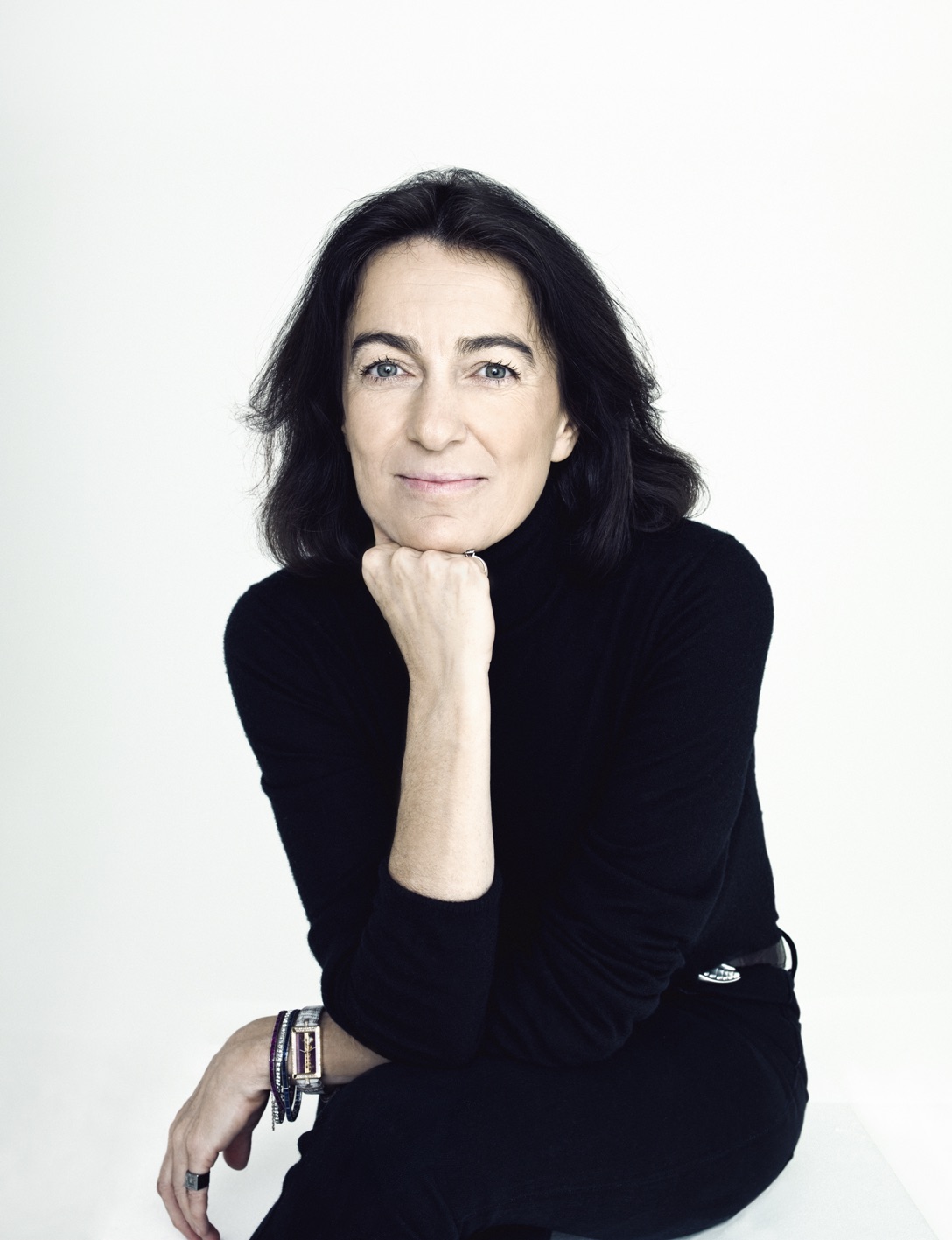
At the age of just 28, Laudomia Pucci found herself taking the helm of her father Emilio Pucci’s fashion house after his untimely death. While the young woman had already worked in design at Givenchy and subsequently within her father’s company in many roles, it was a huge task for someone of such a young age to take on so unexpectedly. There are many ways it could have gone, but luckily for Laudomia and for the rest of the world, she has since succeeded in taking the fashion house from strength to strength.
She has redesigned the style, image, commercial and marketing approach of the brand, including a new distribution pattern worldwide. She has re-launched and re-structured the company and in 2000 she negotiated an agreement with LVMH which included the sale of 67 per cent of Emilio Pucci to the luxury fashion giant. Emilio Pucci has expanded globally from its home in Italy and has become one of the most recognisable brands in the industry thanks to its iconic colourful prints.
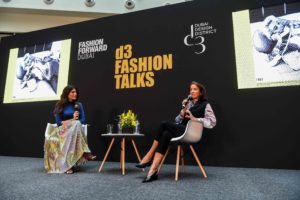
During the FFWD October Edition 2019 at the Dubai Design District
Today, Laudomia Pucci has a focus on developing the brand for the new generation and educating today’s millennial on what it means to use such highly skilled techniques to create beautiful products. The concept of keeping her pieces made in Italy is something that’s very close to her heart and she hopes to continue this legacy with future generations. Laudomia has been working with Italian fashion institute Polimoda. Considered to be the best fashion school in Italy, Polimoda trains young aspiring designers and fashion visionaries in the heart of Florence. Working closely with the Polimoda, Laudomia is often on campus, meeting students and sharing her knowledge and experience through classes and talks. It was, in fact, Polimoda that brought Laudomia to Dubai on a recent visit during Fashion Forward. Laudomia was invited to take part in the Fashion Talks sessions during the recent event. It was here that we met with her to discuss the brand, the importance of educating the younger generations and her plans for the future of Emilio Pucci.
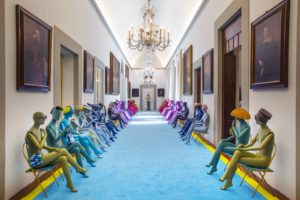
Palazzo Pucci
What are your thoughts on the fashion industry in the Middle East and why did you decide to take part in Fashion Forward?
I came here thanks to Polimoda. Polimoda is something that is very close to my heart and it was the same for my father. In those days he had this vision to offer young people the opportunity to learn and he wanted to give something back. It’s something I have started to appreciate now and I work a lot with young people too. I teach at Polimoda sometimes and I have a close relationship with them and it’s a bit like a home to me. So that’s what brought me here and I’m very grateful for that.
Secondly, I think this is a part of the world that is so full of energy and you need to come here and experience it and touch it to really understand it. I don’t think people realise how strong women are in this region and how determined that can be and that can’t be ignored. You have to be here to really understand that. There is an enthusiasm for fashion that I think is contagious and I think we can learn a lot from that.
Are there any designers in the region that excite you?
There are some fashion shows I was hoping to see while I was here and I would like to do some more research on the local talent as well as visiting the malls. It’s one thing to see a fashion show but it’s very different to see what’s actually in the market. I think it’s really important that there is local creativity happening in the region. It doesn’t matter where you go or where you sell, what matters is how you interpret what you have learnt from your culture.
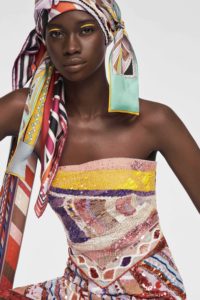
How does it make you feel when young aspiring designers want to meet you or ask for your advice?
I hope it means that I’ve probably done something right! It was very touching to meet a fourteen-year-old here today who is so interested in fashion and it reminded me of my daughter. I don’t think it’s going to be an easy ride for the younger generation, so if they have a strong passion they should cultivate it. It’s nice to be able to give some advice and that’s what I’m trying to do in Florence at Polimoda. We have very high unemployment rates in Italy and a lot of people are moving abroad because they can’t find jobs. We were the country of the Renaissance and we were in the hands of the young ones who were learning at a very young age. I think that we need to restart that and if we can encourage young people to follow their passions and not let go, that’s important.
How do you preserve the heritage of a brand like Emilio Pucci in today’s market but still continue to be modern?
One part is our latest visual campaign. It was created by a friend of mine who is a video designer and I asked him to come up with something that was very Pucci but use a new language to express it. So he took elements of our prints, and created a seasonal moving visual print. It’s about using new mediums to project our ideas and present new ways of saying ‘it’s always me, but I can do different things.’ It’s about finding different ways to tell the story.
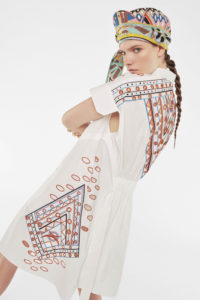
Pucci has had several well-known creative directors but currently, you don’t have one – do you think this will change?
We haven’t no, we are working with a studio but we’re working with a lot of different talents – stylists, merchandisers etc. and it works. That doesn’t mean we’re not going to have a creative director at some point but it is working as it is today.
How important is it to preserve traditional craft techniques and continue to justify the notion of “Made in Italy”?
There are a few ways to look at it. Some countries do certain things beautifully but are weaker in other things. Our beading is done in India for example because no one does it better than them and it’s quite impossible to do it in Italy now. When I was growing up we had in-house ateliers doing the beading and that shows you how things have changed rapidly. But on the other hand, in the Tuscan region we have incredibly skilled artisans when it comes to silk. We are not only manufacturing for brands in Italy but all over the world and I think this is wonderful. If we can keep the quality, then I like to keep the manufacturing in Italy, but if we can’t then we might as well go somewhere else. As long as people are respected in their working conditions.
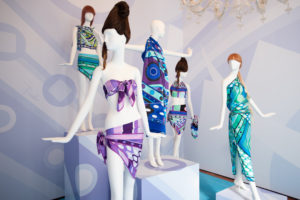
What is the biggest challenge you face today?
The biggest challenge is probably keeping up with time. This isn’t only our challenge but the case for the whole industry. How can you as a creative company manage to keep up with timings when there is so much demand? I’ve worked with creatives my whole life and I feel for them when it comes to time. Imagine being halfway through a drawing and then in the middle, you’re told you have to finish. That’s what they face and we have to try and give space to the creation as well as time for the product to live. But it’s really difficult.
You inherited the company from your father – is it something you would like to see passed on to your children in the future?
I never wanted it to happen when it happened to me. It was an extraordinary challenge and in the end I was lucky it worked, but it easily could not have worked out that way and it could have been one of the most beautiful things in the world thrown down the drain. I don’t think it should be one person’s responsibility. Of course, as you know we consolidated the company with LVMH, so it’s not actually my decision anymore and that makes me feel a lot better!
My eldest daughter is a very creative graphic designer. She does draw scarves and prints and these kinds of things so maybe she will start her own brand, I don’t know. But she is very interested in these things. All of my daughters love fashion and understand the product, they are very quick to see things on the market, but at the end of the day, I think to force something like this onto them is not fair.
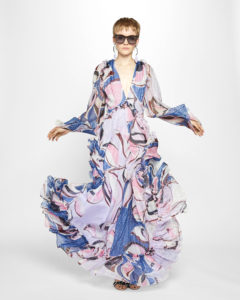
How would you describe Emilio Pucci in one word?
Happy.
READ MORE:
A&E Editorials: Homecoming – A Tribute to Emirati Designers
Roger Vivier and Mytheresa Team Up For An Exclusive Event In Dubai















